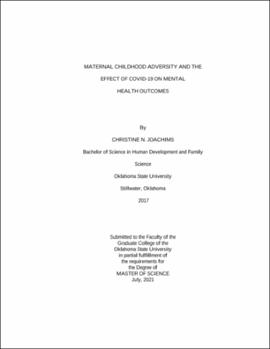| dc.contributor.advisor | Shreffler, Karina | |
| dc.contributor.author | Joachims, Christine N. | |
| dc.date.accessioned | 2022-01-21T19:33:45Z | |
| dc.date.available | 2022-01-21T19:33:45Z | |
| dc.date.issued | 2021-07 | |
| dc.identifier.uri | https://hdl.handle.net/11244/333806 | |
| dc.description.abstract | This study investigates the role of adverse childhood experiences (ACEs) in depression and perceived stress reported among mothers of young children following the onset of the COVID-19 pandemic (May 2020). The COVID-19 pandemic and emergency responses have been widely associated with increased mental health issues. The effects of the pandemic and social distancing measures were particularly concerning for mothers, who were under relatively more stress due to the implications for primary caregivers. Additionally, the COVID-19 pandemic disproportionately affected low-income and minority populations, who may not have had the resources to alleviate health or economic problems. Maternal mental health is critical for healthy child development and has long-term implications for individuals and families. The mothers in this sample (N = 113) were recruited from two prenatal clinics in the South-Central United States in 2017-2018 and have since participated in up to nine waves of online data collection. Initial assessments measured demographic variables and Adverse Childhood Experiences (ACE) scores. The eighth wave of data collection, administered in May 2020, measured depression and perceived stress scores, in addition to asking about pandemic-related stressors (e.g., loneliness, economic insecurity, and health concerns). Linear regression analyses showed number of maternal ACEs to be significantly associated with perceived stress (b = .48, p < .05) and depression (b = .88, p < .05) scores. Loneliness scores appeared to mediate the association between ACEs and perceived stress (b = .99, p < .001), as well as that of ACEs and depression (b = 1.61, p < .001). Neither of the other two COVID-19 stressors measured were significant to either measured mental health outcome. The results from this study indicate that mothers who experienced childhood adversity may be especially vulnerable to the effects of the COVID-19 pandemic on mental health, particularly as they relate to feelings of isolation and lack of social support. | |
| dc.format | application/pdf | |
| dc.language | en_US | |
| dc.rights | Copyright is held by the author who has granted the Oklahoma State University Library the non-exclusive right to share this material in its institutional repository. Contact Digital Library Services at lib-dls@okstate.edu or 405-744-9161 for the permission policy on the use, reproduction or distribution of this material. | |
| dc.title | Maternal childhood adversity and the effect of COVID-19 on mental health outcomes | |
| dc.contributor.committeeMember | Henry, Carolyn S. | |
| dc.contributor.committeeMember | Hays-Grudo, Jennifer | |
| osu.filename | Joachims_okstate_0664M_17351.pdf | |
| osu.accesstype | Open Access | |
| dc.type.genre | Thesis | |
| dc.type.material | Text | |
| dc.subject.keywords | childhood adversity | |
| dc.subject.keywords | covid-19 | |
| dc.subject.keywords | depression | |
| dc.subject.keywords | maternal health | |
| dc.subject.keywords | mental health | |
| dc.subject.keywords | stress | |
| thesis.degree.discipline | Human Development and Family Science | |
| thesis.degree.grantor | Oklahoma State University | |
